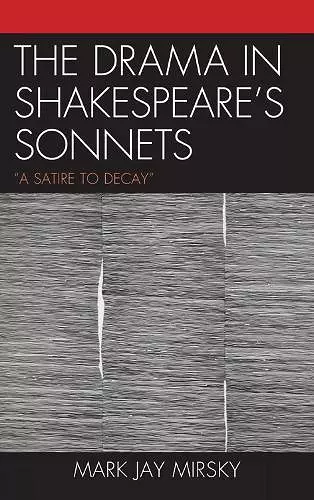The Drama in Shakespeare's Sonnets
'A Satire to Decay'
Format:Hardback
Publisher:Fairleigh Dickinson University Press
Published:5th Aug '11
Currently unavailable, our supplier has not provided us a restock date

The Drama in Shakespeare's Sonnets: "A Satire to Decay" is a work of detective scholarship. Unable to believe that England's great dramatist would publish a sequence of sonnets without a plot, Mark Jay Mirsky, novelist, playwright, and professor of English, proposes a solution to a riddle that has frustrated scholars and poets alike. Arguing that the Sonnets are not just a "higgledy piggledy" collection of poems but were put in order by Shakespeare himself, and drawing on the insights of several of the Sonnets' foremost contemporary scholars, Mirsky examines the Sonnets poem by poem to ask what is the story of the whole. Mirsky takes Shakespeare at his own word in Sonnet 100, where the poet, tongue in cheek, advises his lover to regard "time's spoils"–in this case, "any wrinkle graven" in his cheek–as but "a satire to decay." The comfort is obviously double-edged, but it can also be read as a mirror of Shakespeare's "satire" on himself, as if to praise his own wrinkles, and reflects the poet's intention in assembling the Sonnets to satirize the playwright's own "decay" as a man and a lover. In a parody of sonnet sequences written by his fellow poets Spenser and Daniel, Shakespeare's mordant wit conceals a bitter laugh at his own romantic life. The Drama in Shakespeare's Sonnets demonstrates the playwright's wish to capture the drama of the sexual betrayal as he experienced it in a triangle of friendship and eroticism with a man and a woman. It is a plot, however, that the playwright does not want to advertise too widely and conceals in the 1609 Quarto from all but a very few. Despite Shakespeare's moments of despair at his male friend's betrayal and the poet's cursing at the sexual promiscuity of the so-called Dark Lady, The Drama in Shakespeare's Sonnets sees the whole as a "satire" by Shakespeare and, particularly when read with the poem that accompanied it in the 1609 printing, "A Lover's Complaint," as a laughing meditation on the irrepressible joy of sexual life
Astonishing . . . deep scholarship, imaginative insight, marvelously illuminating analysis. A critical and literary feat. -- Cynthia Ozick, author of The Pagan Rabbi and Other Stories
I am tremendously impressed – the denseness of the analysis, the erudition, wide-ranging intelligence, and the sweetness of some of the insights. I suspect this book is a game-changer for anyone teaching the Sonnets anywhere – hard to see anyone having the audacity to undertake it without Mirsky's book as a reference. -- John Hancock, Director of the film, Bang the Drum Slowly: Academy Award Nominee, Obie Award
What Mark Mirsky has done is lay bare the sonnets, reveal them, and provoke much curiosity about this distinct triangle, the trio of Will Shakespeare and his young male lover and (their) mistress. There seem to be other lovers, from all ends. I was convinced of his argument for "a satire to decay" from the get-go, and could not read it any other light. It is in the words of the sonnets themselves, yet Mirsky makes a very persuasive case for it lying also within their arrangement… His eye is searching, unremitting, but he allows, finally, the greatest English poet to speak for himself. Shakespeare's sonnets are fast-paced, heart-breaking. -- Josephine McKendry
As an English teacher and graduate student, I have found this book incredibly helpful in my approach to teaching and reading Shakespeare. It has made me rethink the sonnets, as Mark Mirsky shows how they tie together as a story, rather than existing as chaotic parts of a sequence…This is a terrific book. -- Jessie Leon
As a novelist and playwright, Mirsky might be more attuned to the drama of the Sonnets than most. Mirsky’s readings can be trenchant and fascinating, especially those of Sonnets 111-26, which use Robert Musil’s short story, “The Perfection of Love” to understand betrayal as spiritual awareness. Although Mirsky’s book may not unriddle a mystery, it complements well the other modern, book-length studies and editions upon which it relies and occasionally challenges, those by Booth, Kerrigan, Vendler, and Duncan Jones. It amplifies our understanding of individual poems and groups of poems if not the whole story. * Sixteenth Century Journal *
ISBN: 9781611470260
Dimensions: 240mm x 164mm x 26mm
Weight: 581g
284 pages